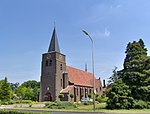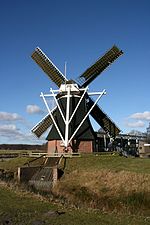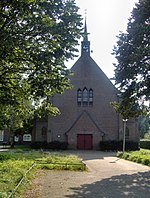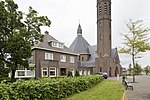Boekelo (Dutch pronunciation: [ˈbukəloː]) is a village in the municipality of Enschede in the eastern Netherlands, the population is estimated at approximately 2,500. It is located just west of Usselo. The village is known for the Military Boekelo Enschede, an international equestrian event.
It is also known for the salt industry, since 1919 located south of the village. This was a reason for the then well-known Bad Boekelo (Bath Boekelo) to have a salt water wave pool. After the opening of the Twentekanaal (Twente canal) the factory of the Koninklijke Nederlandse Zoutindustrie (Royal Dutch Salt-industry) was moved to Hengelo; currently it is called Nouryon Industrial Chemicals.
Textile industry flourished in Boekelo: The N.V. Boekelosche Stoombleekerij (public LLC Boekelo's Steam-bleachery), founded in 1888 by Gerrit Jan van Heek, was taken over by Unilever (who fused it with P. Fenter van Vlissingen & Co's Katoenfabrieken N.V.). On the former factory's terrain, a new quarter called De Bleekerij (The Bleachery) was built. Parts of the old industrial heritage such as old facades and the factory's chimney were integrated into the new buildings.
The internationally known beer brewery Grolsch moved to Boekelo, abandoning its factories in Groenlo and Enschede.
The Museum Buurtspoorweg (lit. Museum Neighborhood-railway) runs a historical museum railway with restored steam locomotives and wagons between Boekelo and Haaksbergen.










